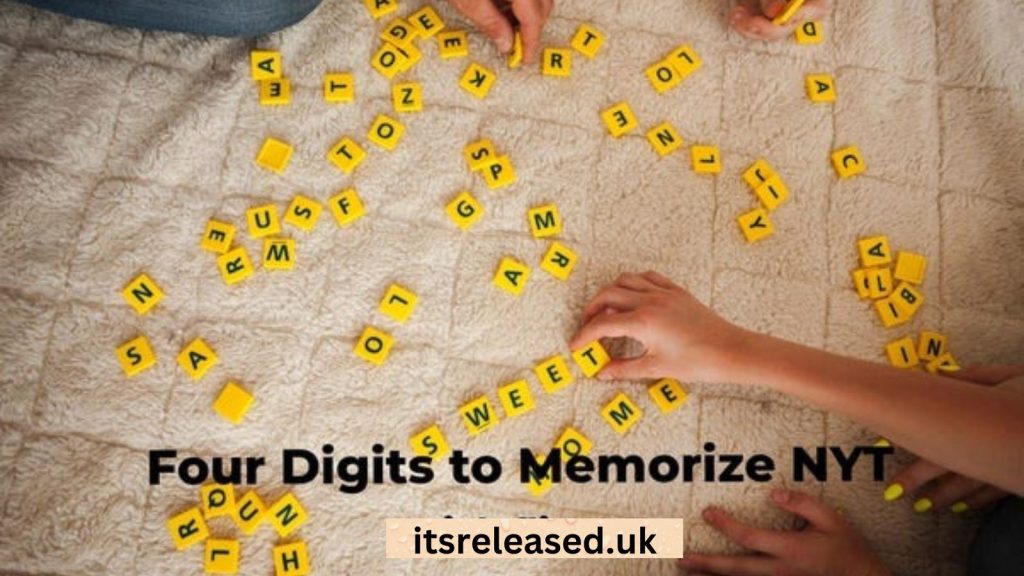In today’s fast-paced world, where digital distractions are ever-present, a quick mental exercise can be a refreshing change. One such challenge is the “Four Digits to Memorize” puzzle featured in The New York Times. This simple yet intriguing puzzle can sharpen your memory and provide a delightful break from routine activities.
What is the Four Digits to Memorize Puzzle?
The “Four Digits to Memorize” puzzle is a brain teaser that tests and enhances your short-term memory. The premise is straightforward: you are presented with a four-digit number that you need to memorize and recall after a brief interval. The puzzle is typically a part of a daily challenge or a memory exercise section.
How to Play the Puzzle
- Presentation: A four-digit number is displayed on the screen.
- Memorization: You are given a few seconds to memorize the number.
- Distraction: After the memorization period, the number disappears, and you might be given a short task or asked to wait for a few seconds.
- Recall: You must recall and input the four-digit number accurately.
Tips and Tricks for Memorizing the Digits
- Chunking: Break the number into two parts (e.g., 4823 can be chunked into 48 and 23). This makes it easier to remember.
- Visualization: Visualize the number in your mind, associating each part with an image or a pattern.
- Repetition: Repeat the number several times in your head or out loud during the memorization period.
- Association: Associate the digits with something familiar, like a significant date or a personal identifier.
Benefits of the Puzzle
1. Enhances Memory
Regularly engaging in this puzzle can improve your short-term memory. The process of memorizing and recalling numbers strengthens your cognitive functions and neural connections.
2. Improves Focus
To memorize the digits effectively, you need to focus intently, blocking out distractions. This practice can help improve your overall concentration levels.
3. Mental Agility
Quickly memorizing and recalling numbers keeps your brain agile and responsive, which is beneficial for problem-solving and critical thinking skills.
4. Stress Relief
Puzzles like this can provide a mental break from stressors, offering a relaxing yet stimulating activity.
Practical Applications of Enhanced Memory
1. Everyday Tasks
Improved short-term memory can help in various everyday tasks, such as remembering phone numbers, addresses, and important dates.
2. Professional Efficiency
A sharper memory can enhance your professional efficiency by helping you recall information quickly, making you more effective in meetings and decision-making processes.
3. Academic Success
For students, improved memory is a significant advantage, aiding in the retention and recall of study materials and improving academic performance.
FAQs about the Four Digits to Memorize Puzzle
Q: How often should I practice this puzzle to see improvements in my memory?
A: Consistency is key. Practicing daily or a few times a week can lead to noticeable improvements in your short-term memory.
Q: Are there any variations of this puzzle?
A: Yes, there are variations that involve longer sequences of numbers or include additional tasks to perform during the memorization period, adding complexity and challenge.
Q: Can children benefit from this puzzle?
A: Absolutely. Children can enhance their memory and concentration skills by regularly engaging in this puzzle, making it a fun and educational activity.
Q: What should I do if I find it difficult to remember the digits?
A: Try using different memory techniques such as chunking, visualization, or association. With practice, you’ll find a method that works best for you.
Conclusion
The “Four Digits to Memorize” puzzle from The New York Times is more than just a simple brain teaser. It offers numerous cognitive benefits, from enhancing memory and focus to providing stress relief. Whether you’re a student, a professional, or someone looking to keep their mind sharp, incorporating this puzzle into your routine can be both enjoyable and beneficial. So, take a few minutes each day to challenge your brain and see the positive impact it can have on your mental agility and overall cognitive health.
